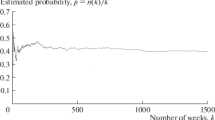Abstract
The word ‘probability’ in ordinary language has two different senses, here called inductive and physical probability. This paper examines the concept of inductive probability. Attempts to express this concept in other words are shown to be either incorrect or else trivial. In particular, inductive probability is not the same as degree of belief. It is argued that inductive probabilities exist; subjectivist arguments to the contrary are rebutted. Finally, it is argued that inductive probability is an important concept and that it is a mistake to try to replace it with the concept of degree of belief, as is usual today.
Similar content being viewed by others
References
Alston W. P. (1985). Concepts of Epistemic Justification. The Monist 68(1): 57–89
Bacchus F. (1990). Representing and Reasoning with Probabilistic Knowledge. MIT Press, Cambridge, MA
Bernardo J. M. and Smith A. F. M. ( 1994). Bayesian Theory. Wiley, Chichester, England
Carnap R. (1950). Logical Foundations of Probability. University of Chicago Press, Chicago, IL
(1972). Probability, Induction and Statistics. Wiley, London
de Finetti, B.: 1980, ‘Probability: Beware of Falsifications!’, in H. E. Kyburg Jr. and H. E. Smokler (eds.), Studies in Subjective Probability, 2nd edn, Huntington, NY: Krieger, pp. 193–224
(1985). Cambridge Probability Theorists. The Manchester School of Economic and Social Studies 53(4): 348–363
Franklin J. (2001). Resurrecting Logical Probability. Erkenntnis 55: 277–305
Gillies D. (2000). Philosophical Theories of Probability. Routledge, London
Hacking I. (1975). The Emergence of Probability. Cambridge University Press, Cambridge, UK
Hacking I. (2001). An Introduction to Probability and Inductive Logic. Cambridge University Press, Cambridge, UK
Howson C. and Urbach P. (1993). Scientific Reasoning: The Bayesian Approach. Open Court, Chicago, IL
Keynes J. M. (1921). A Treatise on Probability. Macmillan, London
(1980). Studies in Subjective Probability. Krieger, Huntington, NY
Maher P. (1993). Betting on Theories. Cambridge University Press, Cambridge, UK
Maher P. (2004). Probability Captures the Logic of Scientific Confirmation. In: Hitchcock, C. R. (eds) Contemporary Debates in Philosophy of Science, pp 69–93. Blackwell, Oxford
Ramsey, F. P.: 1926, ‘Truth and Probability’, in H. E. Kyburg Jr. and H. E. Smokler (eds), Studies in Subjective Probability, 2nd edn, Huntington, NY: Krieger, pp. 25–52
Roeper P. and Leblanc H. ( 1999). Probability Theory and Probability Logic. University of Toronto Press, Toronto
Salmon W. C. (1967). The Foundations of Scientific Inference. University of Pittsburgh Press, Pittsburgh, PA
Skyrms B. (1986). Choice and Chance: An Introduction to Inductive Logic. Wadsworth, Belmont, CA
Suppe F. (1998). Operationalism. In: Craig, E. (eds) Routledge Encyclopedia of Philosophy, pp. Routledge, London
(1989). Laws and Symmetry. Oxford University Press, Oxford
Author information
Authors and Affiliations
Corresponding author
Rights and permissions
About this article
Cite this article
Maher, P. The Concept of Inductive Probability. Erkenntnis 65, 185–206 (2006). https://doi.org/10.1007/s10670-005-5087-5
Received:
Accepted:
Published:
Issue Date:
DOI: https://doi.org/10.1007/s10670-005-5087-5




